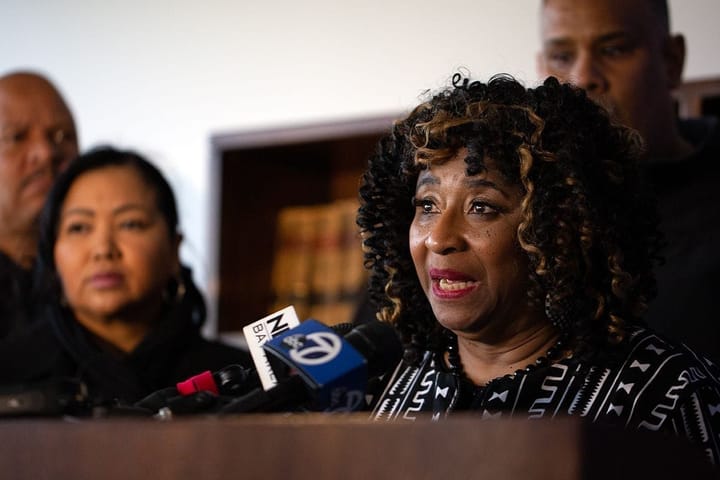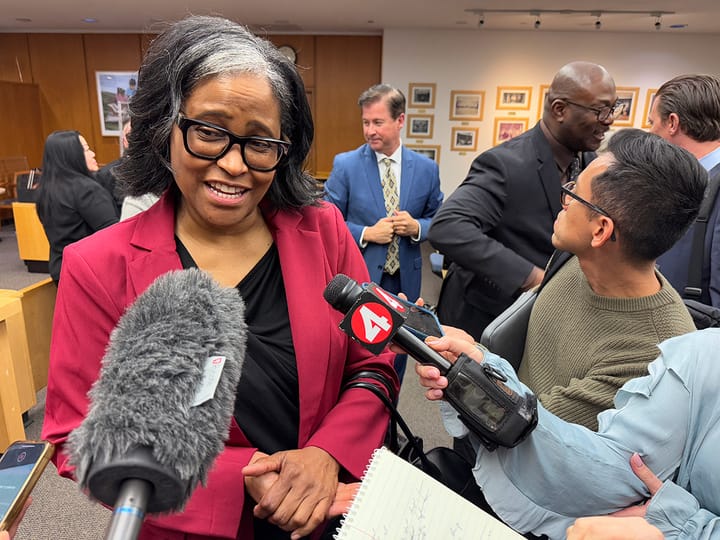Judge rejects 15-year plea deal in case alleging 3 murders
"I can't accept a plea to voluntary manslaughter for 15 years for an offense that involves the loss of three lives," Judge Mark McCannon said.

In a pivotal decision Thursday morning, an Alameda County Superior Court judge rejected a 15-year plea deal in a triple murder case — telling a packed courtroom that he wants a jury to decide.
The case had been about to go to trial when newly elected Alameda County DA Pamela Price brokered the deal last month with defense counsel, Richmond-based attorneys David Briggs and Linda Fullerton.
On Thursday morning, Judge Mark McCannon told those in attendance that he had spent many sleepless nights trying to determine whether the deal would result in a just outcome.
He ultimately said he did not believe it would.
"I can't accept a plea to voluntary manslaughter for 15 years for an offense that involves the loss of three lives," the judge said. "I am not here to do what is popular, but what I believe is right and supported by the law."
Scroll down for an update to the story.
McCannon said that, given all the evidence in the case that he had reviewed, he was left with the lingering question of "what if" the defendant was guilty, which has not yet been determined in a court of law.
Delonzo Logwood, who had recently turned 18 at the time of the shootings in the summer of 2008, had potentially been facing 75 years to life had he been convicted of the crimes with which he was originally charged.
Logwood was not charged with the murders — which allegedly involved a murder-for-hire plot, a carjacking and the killing of a witness to a shooting — until 2015, when he was already incarcerated and facing prison sentences for other violent crimes.
McCannon said from the bench that, had the plea deal gone forward, Logwood likely would have spent just two more years in prison.
"I hand out sentences that I think are just and deserving," he continued. "I don't feel comfortable with this decision."
Judge McCannon said that the district attorney's office had provided "very little information as to why the deal is appropriate" since announcing it in February.
He said the DA's office had provided no information about mitigating factors and that he had received "nothing from the district attorney's office that shows me that they stand behind this."
Last month, McCannon raised strong doubts about the deal, saying he had "never seen a case pled down like this before."
The Berkeley Scanner was one of just two news outlets to attend the hearing last month, but the case ultimately received media attention from around the world due to what appeared to many to be an overly lenient outcome.
On Thursday morning, McCannon said he believed a jury had a right to hear "all of the facts" in the case against Logwood and be able to render its own verdict.
"A jury should decide if he is guilty or innocent, not the media, not Mr. Briggs," the judge said. "A jury should decide. Because none of us were there."
"If he is convicted, then I will decide what an appropriate sentence at that time is," McCannon said.
Jimmie Wilson, a veteran Alameda County prosecutor who runs the felony trial team at the René C. Davidson Courthouse in Oakland, where the hearing took place, represented the DA's office in Thursday's hearing.
Last year, Wilson ran against Pamela Price for the Alameda County DA's seat but was knocked out in the primary as the most conservative candidate on the ballot.
On Thursday morning, McCannon asked ADA Wilson to explain why he was there — representing the DA's office for the first time on the matter — instead of veteran prosecutor Stacie Pettigrew, who handled the case for years.
"I don't have information about that," Assistant District Attorney Jimmie Wilson told the judge.
In fact, Wilson himself had directed Pettigrew not to attend the hearing, according to an email reviewed by The Berkeley Scanner.
According to that email, Wilson emailed Pettigrew on Wednesday night saying he had just talked to Price and "she doesn’t want you at the sentencing."
That is not, however, what Wilson told the judge.
After the hearing, Butch Ford, one of the veteran prosecutors Price put on leave earlier this year, spoke out strongly against Wilson's statement.
"When he said on the record, 'I have no information about that,' it's a flat-out lie. And it's against the ethical canons," said Ford, who attended Thursday's hearing. "DAs don't lie on the record, not in Alameda County."
Ford said Price's decision to pull Pettigrew off the case just before the sentencing hearing was both "unprofessional" and entirely unprecedented for the office.
Pettigrew recently resigned from the district attorney's office after 20 years of service and appears to be part of a growing wave of seasoned prosecutors who have left the office citing ethical concerns.
Sources told The Scanner that, when Pettigrew put in her two-week notice, she told Price that she would attend the Logwood hearing and appear on the case because her last day was not until the end of the month.
(Pettigrew has not spoken to The Scanner herself.)
Price and numerous members of her transition team also attended Thursday morning's hearing but left quickly afterward without making a statement.
She ignored repeated requests for comment from The Berkeley Scanner and other reporters who had watched the proceedings.
The case is now set to return to court April 5 to determine how the process will now proceed.
A closer look at Judge McCannon's reasoning
Update, 7:30 p.m. On Thursday morning, Judge McCannon took his time to explain his position to the court in detail.
"This case is too important to you all for you all not to receive an explanation and some clarity," he said.
McCannon said he wanted to be "as transparent as possible" to explain his role in the process given that judges are not otherwise allowed to comment on pending cases.
He said he wanted to explain how he viewed the case and how he had come to his decision, particularly given that many people don't understand how the justice system works despite having strong opinions about it.
McCannon described the voluminous record associated with the case, which includes more than 2,000 pages of motions or requests for court action.
He said there had been more than 30 days of court appearances and "countless hours of legal research and analysis by the court as well as by the attorneys."
"In those 30 days, both sides have never indicated to me, other than Mr. Briggs, that there were proof issues or that the evidence was weak," McCannon said.
He went on to note that it is the job of Briggs, as Logwood's attorney, to make arguments like that, but said the prosecution had never made that assertion.
McCannon said the defense had challenged the strength of the prosecution's evidence twice in the past to ask for dismissal — and that two judges, himself included, had reviewed the evidence and found it "strong enough to merit a trial."
McCannon's own finding on that question, which took place in November 2022, was based on a review of the relevant pieces of the preliminary hearing transcript, he said. The prior judge had reviewed the entire transcript, which spans more than 1,000 pages.
In preparation for Thursday's hearing, McCannon said he had reviewed 113 recorded conversations between Logwood and a cellmate — as provided by the prosecution — "for a fourth time."
McCannon read some of those statements into the record in a hearing last month and said they had made him concerned about the possibility that Logwood might commit violent crimes upon his release.
He said he had also reviewed legal analyses from attorneys on both sides and focused on Logwood's behavior "in court and out of court."
He reviewed a 21-page probation report and read a 39-page sentencing memorandum from the defense "multiple times."
He said he had read Logwood's apology along with "multiple letters from concerned citizens that strongly disagree with what they consider a lenient sentence offer for such offenses."
He said he had also looked at the plea deal itself — one count of voluntary manslaughter in relation to 22-year-old Eric Ford with the other counts dismissed — in relation to the three murder accusations.
The judge took a few minutes to discuss Logwood's apology in light of the plea and said he had found it "inconsistent."
"You can’t think that an apology will make all of this better, prevent further bloodshed or make people feel better about the loss of their loved ones," McCannon said. "And the whole thing about an apology, you’re telling me that you’re sorry. What are you sorry for if you didn’t do anything?"
"Every case is different," the judge continued. "Now, an apology in one case might mean something. In others, it might not be sufficient at all."
He said the courts are charged with deciding whether a plea deal is appropriate and must consider multiple factors, from a vigorous prosecution to the imposition of appropriate punishment to the protection of victims and witnesses.
Courts must make an "informed decision in furtherance of the interest of society," he said.
The judge also said he wanted to clarify a defense statement that the probation department had signed off on the deal.
"There was no letter from the district attorney’s office to explain how we got here or to support this plea agreement," McCannon said. "In the probation report, there were only facts as to one of the murder allegations. So probation didn’t read the full, factual [account] of all three of these offenses."
He also took issue with assertions by Briggs that Logwood had been attempting to reduce violence in Oakland through community work with a local religious leader.
Judge McCannon said he had been struck by the timing of the news, which came Thursday morning.
"This is something that you all held onto until today. And didn’t tell anyone," McCannon said. "That’s something that I’ve never heard of."
He said, given that defense counsel would have wanted to get the best deal for their client, this information should have come to light sooner, during plea bargain negotiations.
"I’m concerned with the fact that, after a plea is taken or agreed to," McCannon said, "now all of a sudden we hear those things."
He said the possibility that Logwood did commit all three murders had weighed heavily on his mind.
"I stayed up many nights thinking about this case: how it will affect Mr. Logwood, how it will affect the victims' families, how it will affect witnesses who come in and testify about the things that they see," the judge said.
Generally, McCannon said, he leans on the prosecution to reduce the length of sentences.
"I realize that any amount of time that someone spends in custody, in jail, is horrible," he said. "I’ve got family in jail. I’ve got friends in jail. So this isn’t lost on me."




